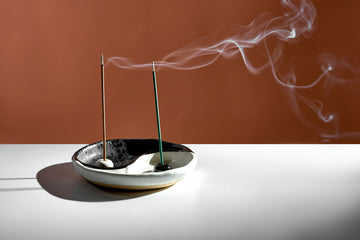Chinese incense is a traditional aromatic product made from a combination of ground woods, resins, herbs, and spices. It has been used for over 2,000 years in homes, temples, and healing practices across Asia. Today, people around the world use Chinese incense to create a calming space, relieve stress, or enhance meditation.
This guide will walk you through what Chinese incense is, the different types available, how it's used, what it's made of, and what you need to know about using it safely in modern homes.
Understanding Chinese Incense

Chinese incense is known for its natural ingredients and calming properties. It is often used in quiet moments—during tea rituals, meditation, reading, or simply when one needs a mental reset. The scent is usually gentle and subtle, designed to clear the mind rather than overpower the senses.
Its role is more than fragrance. It supports emotional clarity, personal rituals, and atmosphere building. Many find that lighting incense becomes a quiet daily habit that helps bring stillness into their lives.
Types of Chinese Incense
Chinese incense comes in a variety of forms, and each one suits different settings and preferences:
-
Incense sticks: The most common type. They burn evenly and are easy to place in incense holders. Ideal for everyday use.
-
Backflow cones incense: These cones produce a dense smoke that flows downward through special burners, creating a visual waterfall effect. Often used for relaxing or decorative purposes.
-
Coils incense: Long-lasting and circular in shape. They are best for large spaces and extended burning sessions.
- Powder incense: Often used in traditional ceremonies. Powder is placed in a mold and burned slowly, releasing a soft and focused scent.
Each type provides a unique sensory experience. Stick incense is simple and efficient. Cone incense adds a visual element. Coils last longer. Stamped incense offers a sense of ritual.
What Ingredients Are Used in Chinese Incense?
Traditional Chinese incense uses only plant-based raw materials. The main components are:
-
Wood powders like sandalwood and agarwood
-
Natural resins such as frankincense, myrrh, and storax
-
Herbs and flowers including mugwort, chrysanthemum, osmanthus, and clove
- Spices like star anise, cinnamon, and patchouli
Each batch is blended carefully to create specific effects: some are warming, others are calming, and some are bright and floral.
No artificial fragrances, synthetic binders, or chemical additives are included in high-quality incense. All the fragrance comes from natural materials ground into powder, shaped, and dried by hand.
How to Use Chinese Incense at Home

Using incense is simple:
-
Place the incense stick or cone in a stable incense burner.
-
Light the tip until it begins to glow.
-
Gently blow out the flame, leaving a red ember.
-
Allow the smoke to rise and fill the space.
Chinese incense is often used in:
-
Meditation or breathwork practice
-
Evening wind-down routines
-
Reading corners or home offices
-
Bath rituals or gentle yoga
-
Morning clarity rituals
Many people create a “calm corner” at home—a space with incense, tea, and soft lighting—to reset their mood.
Is Chinese Incense Safe for Children and Pets?
This is one of the most common questions from customers. The answer depends on two factors: the quality of the incense and how it is used.
High-quality incense, made with natural herbs and no synthetic ingredients, produces very low levels of smoke. It does not release harmful chemicals or residues. It is suitable for indoor use when used in moderation and with proper ventilation.
However, children and pets are more sensitive to any type of smoke. We recommend:
-
Using incense in well-ventilated areas
-
Avoiding incense use in small, closed rooms shared with babies or pets
-
Keeping burners out of reach of children
-
Using mild or floral incense around pets (avoid overly spicy or resin-heavy blends)
If you’re unsure, try short sessions first and observe your household’s response. Floral and herbal blends like osmanthus, chrysanthemum, and mugwort tend to be gentler.
Chinese Incense vs. Western Scents
| Feature | Chinese Incense | Western Scented |
|---|---|---|
| Cultural Origin | Rituals, meditation, healing | Interior décor, mood enhancement |
| Main Materials | Herbs, woods, resins, natural oils | Paraffin or soy wax, fragrance oils |
| Usage Context | Spiritual focus, mental clarity, sleep aid | Cozy ambience, seasonal decoration |
| Burning Experience | Rising smoke, steady aroma | Open flame, wax pool scent |
| Sensory Focus | Scent and atmosphere with symbolic meaning | Visual warmth and strong fragrance |
| Health Impact | Natural ingredients, low irritants | May contain artificial chemicals |
Chinese incense and Western scents serve different emotional needs. While scents add visual warmth and fragrance, Chinese incense offers depth, intention, and tranquility that connects both mind and body.
Why Try Chinese Incense?
Chinese incense offers a unique sensory experience that supports quiet moments, mindful living, and emotional clarity. It is rooted in history but fits naturally into modern life.
Whether you're seeking better sleep, a more focused mind, or a new daily ritual, Chinese incense can become part of your wellness space.
Explore different scents, try various forms, and find what suits your rhythm.




